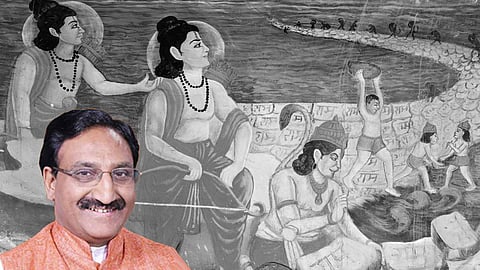

Union Minister Ramesh Pokhriyal 'Nishank' had addressed the gathering at the IIT Bombay convocation on August 10 but the students are not happy with him. In their in-house publication, Insight, the students "addressed the reaction of certain portions of the student populace towards the institute’s apparent inconsiderate choice of the Chief Guest" and slammed the Minister's speech and accused him of "scientific blasphemy".
Calling it a "wonderful coming of age ceremony" for the graduating batch, the article titled "The Fault in our Convo Again" says that the sheen of the occasion was slightly diminished by the controversy stirred by Pokhriyal's controversial statements about Sanskrit being used for 'talking computers' and the true inventor of molecules and atoms. "It is presumable that he made these statements to kindle a sense of pride in the cultural identity of Indians and advocated the concept of modern development rooted in traditional values," reads the article. "However, facts and feelings should not be intertwined," it adds.
The article points out that the 1985 paper by former NASA scientist Rick Briggs that Pokhriyal claims to have sourced his information from does not say that Sanskrit is the only language that can help in making talking computer but it says that Sanskrit is one of many that fit the bill. "One tends to wonder how a person can misquote academic literature in one of the premier technical institutions which produce, according to him, some really sharp scientific minds. It is a mild form of scientific blasphemy," reads the article. "When a statement like this is met with applause and left unchecked, it provides fodder to the propagators of pseudo-science everywhere," it adds.
“I feel our Institute is somehow complacent in its supposed immunity from the impact of this invitation. Isn’t inviting him to these important events giving him a platform to air this pseudo-science? I think a lot of people will read it as validation, seeing these comments made from the supposed altar of IIT Bombay. Nandan Nilekani was there, why couldn’t he have been the chief guest?," asks Nikhil, one of the graduating students present at the convocation.
Dhrumil, another student who graduated this year, talks about the repercussions of this attitude of the institute, “Convocation could actually be the best place for them to establish a long term relationship between alumni and institute. If they think about such factors (Pokhriyal for Chief Guest) for convocation, it sometimes makes the students feel that they are probably better off being connected to people they know than being connected to the institute, because the institute doesn’t care about our opinions which could finally affect their alumni connections, one of the most significant factors that make the institute what it is.”
IIT Bombay did not, in any way, endorse Pokhriyal’s views, but they did not discredit them either. "It is understandable that this was done in order to maintain the dignity of the event and the institute, and is hence justified to an extent. But one can certainly question the choice of the Chief Guest in the first place. An esteemed individual who recognises, endorses and embodies the scientific and moral values that are associated with an institute like IIT Bombay is certainly not too big of an ask, considering that there are several alumni who are well placed today and are apt to be considered for the role of Chief Guest," concludes the piece.
